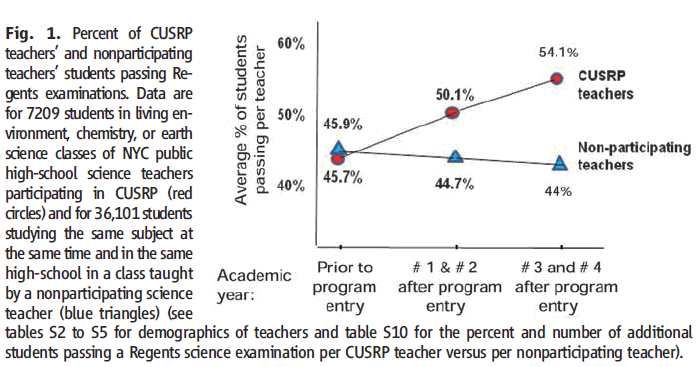|
|
|
|
|
|
|
News & Views item - November 2009 |
![]() Teachers’ Participation in Research Programs Improves Their Students’
Achievement in Science. (November 2, 2009)
Teachers’ Participation in Research Programs Improves Their Students’
Achievement in Science. (November 2, 2009)
That header is the title of a report published in the October 16, 2009 issue of Science by Samuel C. Silverstein, Jay Dubner, Jon Miller, Sherry Glied and John D. Loike. They analysed the results from 7209 students in living environment, chemistry, or earth science classes of NYC public high-school science teachers participating in Columbia University’s Summer Research Program (CUSRP) and for 36,101 students studying the same subject at the same time and in the same high-schools in classes taught by non-participating science teachers.
They summarise their work:
Research experience programs engage teachers in the hands-on practice of science. Program advocates assert that program participation enhances teachers’ skills in communicating science to students. We measured the impact of New York City public high-school science teachers’ participation in Columbia University’s Summer Research Program on their students’ academic performance in science. In the year before program entry, students of participating and nonparticipating teachers passed a New York State Regents science examination at the same rate. In years three and four after program entry, participating teachers’ students passed Regents science exams at a rate that was 10.1% higher (P = 0.049) than that of nonparticipating teachers’ students. Other program benefits include decreased teacher attrition from classroom teaching and school cost savings of U.S. $1.14 per $1 invested in the program.
Note: there is an error in the caption to the figure below -- for "in a class taught by a nonparticipating science teacher" read "in classes taught by non-participating science teachers". It is stated correctly in the body of the paper.

The paper concludes with the paragraph:
More than 28,500 students studied Regents-level Living Environment [biology], chemistry, or earth science in classes of the 95 NYC public high-school science teachers who completed CUSRP between 1994 and 2005. We estimate that during this period, 2339 (8.25%) more CUSRP than non-CUSRP teachers’ students passed a Regents exam in one of these sciences and that 15 more CUSRP than non-CUSRP teachers were retained in classroom teaching. Accordingly, NYC’s DOE saved $5.3 million in course repetition and teacher recruitment costs, or $2.01 per $1.00 that CUSRP’s sponsors invested in the program. If in addition, 10% (234) of these students earned Regents diplomas, the United States will benefit from the ~$42.8 million in additional lifetime tax payments and health, welfare, and criminal justice cost savings they generate. CUSRP’s ease of implementation, effectiveness, and individual and societal benefits have led to its adoption by Singapore’s Ministry of Education. We suggest that it is a model for in-service science teacher professional development that significantly improves student science achievement.
For those who may have an active interest the full reference to the paper is:
Science 16 October 2009:
Vol. 326. no. 5951, pp. 440 - 442
DOI: 10.1126/science.1177344
In addition there are some 20 pages of supplementary material on line.